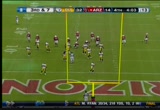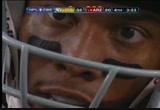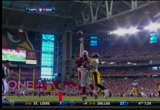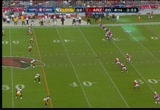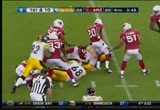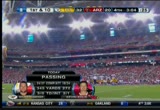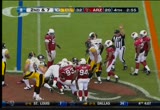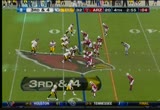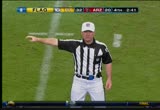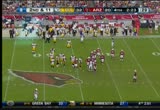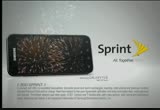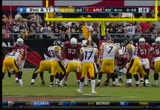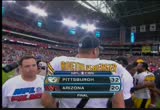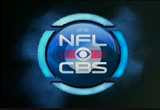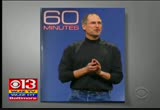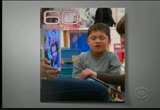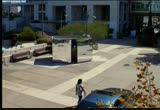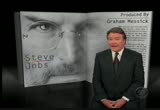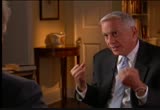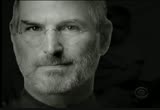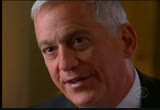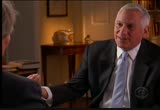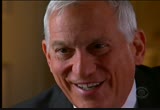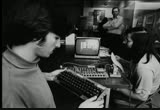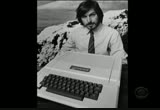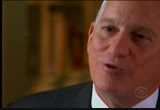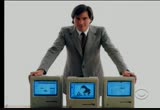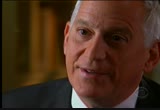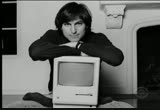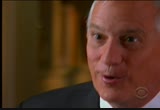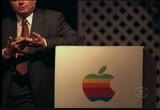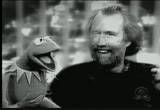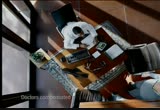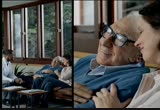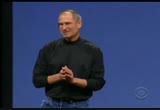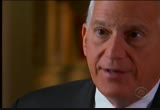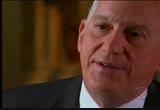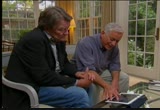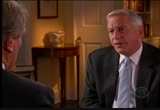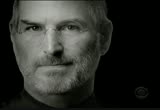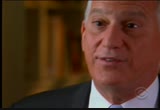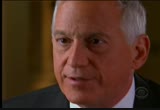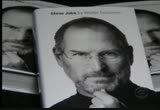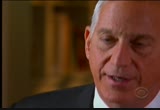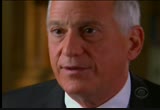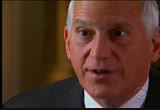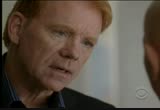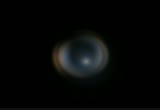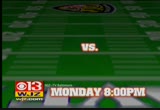tv 60 Minutes CBS October 23, 2011 7:00pm-8:00pm EDT
7:00 pm
dan: if we get the cardinals to stick it in the end zone the last four minutes might get exciting. onsides kick. cardinals have all three of their time-outs left. greg: third and 7. kolb complete and out of bounds is andre roberts at about the 3. and right at the first down marker it will be first and goal. those of you expect to see "60 minutes" you are watching the nfl on cbs. greg gumbel along with dan dierdorph. it will be seen in its entirity immediately following this game expect on the west coast. we are just under four minutes to play. kolb, touchdown. dan: cardinals have to go for two, i would think.
7:01 pm
greg: early doucet with the touchdown catch. and they will go for two. dan: yeah. that was just a lapse in the steelers coverage. kolb did a good job of identifying who was covered. that was made pretty easy. but you are down by 12. the magic chart says this is a go for two situation and try to make it a 10-point game. play fake. kolb looking and looking. ran out of time. throws it incomplete.
7:02 pm
dan: when it is a two-point conversion, throw it somewhere or maybe get lucky and someone can catch it in the field of play. nobody is go to catch it out of bounds. greg: you brought it up to kevin kolb. if there was anybody that would have used the extra work during the summer when the player lockout took place, it was the guys on this team. dan: that goes for every other team. that was a pretty good throw by kolb going right into the lens of our camera. our man down there took one for the team. greg: i don't think he has a bruise on him. dan: the cardinals now have to
7:03 pm
go for an onsides kick. seeing that you need two touchdowns now to take the lead in this game. i don't know, even that you have all three time-outs, i am not sure i would count on getting the ball back really quickly from the steelers. they kick it deep. they will let the steelers start from their 20-yard line. let's check in once again with james brown and bill cowher in new york. james: minnesota within six of green bay. bill: they found their quarterback of the future, cristion ponder. two touchdowns, two interceptions but they pull to within six of green bay. james: capping a 10-play,
7:04 pm
93-yard drive. greg: i wonder if coach cower's ears were burning as we were talking with the steelers and ex steelers coaching. dan: this is like watching his children play on both sides of the ball. who does bill root for? greg: isaac redman, first down yardage, out to about the 34-yard line. dan: that is why i would have gone for the onsides kick. even though there is all sorts of offensive line injuries, bill cowher is an expert at this. he knew how to take the air out of the football. the cast of characters has changed. it is not jerome bettis anymore
7:05 pm
but it is the same principle. greg: a quick pass. antonio brown. first down across the 45. inoue whisenhunt will take a time-out now and stop the clock. greg: arizona uses its first of three remaining with 3:04 remain to play here in the fourth quarter. passing numbers today -- dan: the one turnover by kevin kolb directly led to a steelers touchdown. another banner day for big ben. still, beanie wells, he left in the first half and hasn't been seen since with a knee strain, a right knee strain. they never did get mendenhall loose. and you see the three receptions for 118 by mike wallace.
7:06 pm
greg: antonio brown with seven catches for 102. dan: when you have two receivers going over the century mark -- again, the cardinals did not allow pittsburgh to get -- they allowed a run for a first down. but still the steelers, under 80 yards rushing for the game. good work by the cardinals defense. greg: mewelde moore. clock now continues to move. tonight on cbs 60 minutes. dan: how fitting you do a promo for 60 minutes and the play of the game was turned in my mike wallace. greg: that is how ben
7:07 pm
roethlisberger has distributed the ball today. , we talked earlier about hines ward and the kids. you know heath miller is not a kid anymore. he has been doing it for a long time. but there is so much young talent on this football team. hines ward has mentored them. their source of a lot of quality information. greg: we asked hines ward if he still watches "dancing with the stars." absolutely. dan: of course. greg: he is as fun-loving of a guy as there is. dan: you know, the nice thing about it as i talk about him being a mentor to his defensive back but he is mentoring the entire team on how to samba. greg: this is behind the scenes of a shampoo commercial, hines
7:08 pm
ward doing the cha-cha, and then brett keisel. this is tuesday at pittsburgh practice. dan: i am sure hines insisted on leading. he is just that type of guy. he is not going to be happy that we aired that. greg: no. brett keisel with his real beard. can you win a dance competition with a beard like that? dan: i can't think about it. he is the only guy that i know that wears a beard extension. greg: nice throw by roethlisberger. caught by emanuel sanders. first down. dan: you don't have to just run the football to kill the clock when you have a quarterback that you have confidence in like ben roethlisberger. and this is more than a little frustrating for the cardinals
7:09 pm
that they chose not to do an onsides kick. now they can't get the ball back. greg: arizona used its third and final time-out. this is moore to the outside. penalty markers fly. look at all of the flags on the field. i count three of them. >> holding, number 83, offense. 10-yard penalty, first down. greg: heath miller must have come up with a hold that could be seen all the way to flagstaff. everybody saw it. dan: when you are the tight end, you are right out there on the edge. you do not have the luxury of being hidden by the guards and tackles in the middle.
7:10 pm
greg: we have some footage of you throwing a block down here. this is moore. dan: he stays inbounds. hines ward might want be too happy with us for showing that footage of the commercial. greg: well, that play takes us to the two-minute warning. and with two minutes to play and a 32-20 lead, the pittsburgh steelers, dancing their way to a 5-2 record.
7:11 pm
but the jeep grand cherokee uses advanced technology. like the quadra-lift air suspension that lowers the vehicle at highway speeds to improve aerodynamics and deliver a more than 540 mile driving range. so you can raise your standards while lowering your fuel consumption. ♪ ♪ $5 ♪ $5 ♪ $5 footlong [ male announcer ] october's now anytober! any regular footlong is a $5 footlong! startin' at 7am! subway. eat fresh. think you can beat my time? you better run fast. [ female announcer ] apolo's training with the subway turkey breast his way, with tomatoes, green peppers and jalapenos! subway. the official training restaurant of apolo ohno and athletes everywhere.
7:12 pm
for going over 2 gigabytes of data. t-mobile slows down your data speed. with sprint you don't get charged extra and you don't slow down. and you get unlimited data, text and calling to any mobile -- for only $79.99. the best unlimited plan...wins. make the most of unlimited data with a brilliant screen on a pencil thin phone. introducing the samsung galaxy s ii epic 4g touch. trouble hearing on the phone? visit sprintrelay.com. greg: not a bad day for number
7:13 pm
7. 25-38, three touchdowns. you remember early in the season had a pension terror turning the ball over. not lately. out here to emanuel sanders. a reminder tonight cbs begins with "60 minutes" and steve jobs' life story. dan: the cardinals have no more time-outs remaining. the clock will continue to run. you know, ben has had a great day today through the air with three touchdowns and no interceptions. while he only has been sacked a couple of times, he took some pretty good pops today. greg: and ben will take the snap here. talking earlyier about my broadcast partner here and a member of the ring of honor
7:14 pm
here in arizona. we will flashback to his playing days. where are you? number 72, leading the way. go get them. boom! dan: that was at old soldier field. greg: looking like your normal, pleasant self. dan: i played my whole career for this franchise. even though it was in st. louis it is still the same group. a lot of wonderful memories. greg: and with that snap the pittsburgh steelers will move to 5-2 on the year and extend the cardinals' losing streak to five in a row. they won their opener against carolina and lost now to washington, seattle, giants, minnesota and the pittsburgh steelers. dan: ken whisenhunt and a lot of friends on that steelers
7:15 pm
coaching staff. but it will be a tough week out here in the desert. he will have to answer a lot of question it is about where they are headed. greg: once again our final score pittsburgh 32 and arizona score pittsburgh 32 and arizona 20. like so many great pioneers before me, guided only by a dream. i'm embarking on a journey of epic proportion. i will travel, from sea to shining sea, through amber waves of grain, and i won't stop until i've helped every driver in america save hundreds on car insurance. well i'm out of the parking lot. that's a good start. geico, fifteen minutes could save you fifteen percent, or more on car insurance.
7:17 pm
7:19 pm
captioning funded by cbs and ford-- built for the road ahead. >> thank you for coming. we're going to make some history together today. ( cheers and applause ) >> kroft: when steve jobs hand- picked walter isaacson to write his life story, he had already been diagnosed with cancer. but after 40 interviews, the biography provides a vivid picture of a complicated man. i think it's a tough book. >> it's a book that's fair. i mean, this is a real human being. >> kroft: tonight, for the first time, you will hear tape recordings of jobs himself talking about being adopted, creating apple, and his regret
7:20 pm
over ignoring what could have been life-saving cancer surgery. >> you're born alone, you're going to die alone. and what exactly is it that you have to lose? there's nothing. >> it's so much more intimate than a laptop. >> stahl: when steve jobs unveiled the ipad, there was no way he could have predicted what it would mean to people with autism. it turns out it may be the perfect device to help unlock the isolation many with autism feel by helping them communicate in ways they couldn't before. >> i want a drink. >> i always had said, when he was younger, it was like he was a computer and i was computer illiterate, and i didn't know how to press the right keys... sorry. that was the hard part-- you knew there was more in there and you didn't know how to get it out. >> i'm steve kroft. >> i'm lesley stahl. >> i'm morley safer. >> i'm bob simon. >> i'm lara logan. >> i'm scott pelley. those stories tonight on "60 minutes."
7:21 pm
ford fusion has now been named the most dependable midsize car by jd power and associates. we go to kimberly. any thoughts on this news? i have no idea what's goin on. we are out. what was that? they told me it's the most dependable midsize sedan and they ran back into their little box. [ male announcer ] we're not employers or employees. not white collar or blue collar
7:22 pm
or no collars. we are business in america. and every day we awake to the same challenges. but at prudential we're helping companies everywhere find new solutions to manage risk, capital and employee benefits, so american business can get on with business. ♪ flavor, meet food. introducing swanson flavor boost. concentrated broth in easy to use packets. mix it into skillet dishes, for an instant dose of... hell-o! [ female announcer ] new swanson flavor boost. isn't some optional pursuit. a privilege for the ultra-wealthy.
7:23 pm
it's a necessity. i find investments with e-trade's top 5 lists. quickly. easily. i use pre-defined screeners and insightful trading ideas to dig deeper. work smarter. not harder. i depend on myself the one person i do trust to take charge of my financial future. [ bell dinging ] >> kroft: seven years ago, steve jobs asked walter isaacson, a former editor of "time" magazine, if he would write his biography. isaacson, who has done books about benjamin franklin and albert einstein, thought the request presumptuous and premature, since jobs was still a young man. what isaacson didn't know at the time, and only a few people did, was that jobs was about to undergo surgery for pancreatic cancer and was feeling his mortality.
7:24 pm
it speaks to the secrecy with which jobs conducted his life and his business, adding mystery to an already compelling figure. in 2009, with jobs already gravely ill, isaacson began the first of more than 40 interviews with him. the last was conducted a few weeks before his death. some of them were tape-recorded, and you will hear parts of them tonight. "i have no skeletons in my closet that can't be allowed out," jobs said. and like a well-timed apple launch, the book, titled simply "steve jobs," will be in stores tomorrow, just two and a half weeks after he died. when walter isaacson first began working on the book, which is published by simon and schuster, a division of cbs, steve jobs' wife, laurene powell, told him, "be honest with his failings as well as his strengths. there are parts of his life and his personality that are extremely messy. you shouldn't whitewash it. i'd like to see that it's all told truthfully."
7:25 pm
>> walter isaacson: he's not warm and fuzzy. >> kroft: and to do it, isaacson interviewed more than 100 people-- jobs' friends, family, co-workers and competitors. i think it's a tough book. >> isaacson: it's a book that's fair. i mean, this is a real human being. >> kroft: he had lots of flaws. >> isaacson: he was very petulant. he was very brittle. he could be very, very mean to people at times. whether it was to a waitress in a restaurant, or to a guy who had stayed up all night coding, he could just really just go at them and say, "you're doing this all wrong. it's horrible." and you'd say, "why did you do that? why weren't you nicer?" and he'd say, "i really want to be with people who demand perfection. and this is who i am." >> kroft: isaacson believes that much of it can be traced to the earliest years of his life, and to the to the fact that jobs was born out of wedlock, given up by his birth parents, and adopted by a working class couple from mountain view, california. >> isaacson: paul jobs was a salt-of-the-earth guy who was a great mechanic.
7:26 pm
and he taught his son steve how to make great things, and he... once, they were building a fence. and he said, "you got to make the back of the fence that nobody will see just as good- looking as the front of the fence. even though nobody will see it, you will know, and that will show that you're dedicated to making something perfect." >> kroft: jobs always knew he was adopted, but it still had a profound effect on him. he told isaacson this story from his early childhood during one of their many taped interviews. >> steve jobs: i was, i remember, right here on my lawn, telling lisa mcmoylar from across the street that i was adopted. and she said, "so does that mean your real parents didn't want you?" ooh, lightning bolts went off in my head. i remember running into the house, i think i was, like, crying, asking my parents. and they sat me down and they said, "no, you don't understand. we specifically picked you out." >> isaacson: he said, "from then on, i realized that i was not
7:27 pm
just abandoned. i was chosen. i was special." and i think that's the key to understanding steve jobs. >> kroft: another factor was geography. jobs grew up in northern california, not far from palo alto. he was a gifted child, who tested off the charts, in a neighborhood populated by engineers. >> isaacson: yeah, he was raised in the place that was just learning how to turn silicon into gold. it had not yet been named "silicon valley," but you had the defense industry, you had hewlett-packard. but you also had the counter- culture, the bay area. that entire brew came together in steve jobs. he was sort of a hippie-ish rebel kid, loved listening to dylan music, dropped acid. but also, he loved electronics. >> kroft: jobs would eventually cross paths with a computer wizard at berkeley five years his senior named steve wozniak. they became fast friends, sharing a love of high-tech pranks and a disdain for authority. one of the things they did was to copy and improve an illicit
7:28 pm
device called a "blue box", which reproduced the tones that the phone company used and allowed users to make free long distance phone calls. >> isaacson: wozniak loves the blue box. he's doing it as a prank. steve says, "we can sell them. we can market them." and they sold about 100 of them, and jobs said to me, "that's the beginning of apple. when we started doing that blue box, i knew that, with wozniak's brilliant designs and my marketing skills, we could sell anything." >> kroft: that was still a few years off. jobs enrolled at reed college in oregon at a time when timothy leary was telling students across the country to turn on, tune in, and drop out. jobs did after one semester. >> jobs: the time we grew up in was a magical time. and it was also a very, you know, spiritual time in my life. definitely, taking lsd was one of the most important things in my life and... not the most
7:29 pm
important, but right up there. >> kroft: he eventually drifted back to his parents' house and became one of the first 50 employees to work for the video game maker atari. but he was not a big hit with his co-workers. he never wore shoes, had very long hair, never bathed. in fact, when he went to work for atari, they put him on the night shift because people said he smelled so bad, they didn't want to work with him. >> isaacson: you know, he believed that his vegan diet and the way he lived made it so he didn't have to use deodorant or shower that often. it was an incorrect theory, as people kept pointing out to him at atari. you know, he was a pretty abrasive and, in some ways, you know, cantankerous character. but these people at atari, they kind of get him. and they say, "well, we don't want you to leave, but how about working the night shift?" >> kroft: jobs took a leave from atari and spent seven months wandering across india looking for spiritual enlightenment. and it turned out not to be a waste of time. >> isaacson: and when he comes back, he says, "the main thing i've learned is intuition, that
7:30 pm
the people in india are not just pure rational thinkers, that the great spiritual ones also have an intuition. likewise, the simplicities of zen buddhism really informed his design sense, that notion that simplicity is the ultimate sophistication. >> kroft: when he returned from his trek, jobs and wozniak started building and peddling a primitive computer for hobbyists. with a $1,300 investment, they founded apple computer in his parents' garage. explain to me how somebody who was a hippie, a college dropout, somebody who drops lsd and marijuana, goes off to india and comes back deciding he wants to be a businessman? >> isaacson: jobs has, within him, sort of this conflict, but he doesn't quite see it as a conflict, between being hippie- ish and anti-materialistic, but wanting to sell things like wozniak's board, wanting to create a business. and i think that's exactly what silicon valley was all about in those days. "let's do a startup in our
7:31 pm
parents' garage and try to create a business." >> kroft: so we don't have to work for somebody else? >> isaacson: right. and steve jobs wasn't all that eager to be an employee at hewlett-packard. >> kroft: he was never much of an engineer. isaacson says he didn't know how to write code or program a computer. that was wozniak's department. but jobs understood their importance and their future. he was obsessed with making an attractive, simple, inexpensive computer-- the apple ii, marketed as the first home computer. it really didn't do much, but tech-savvy people snapped them up, along with school systems. and as he tells isaacson on tape, he was soon worth millions of dollars. >> jobs: it wasn't very many years before, on paper, we were worth a lot of money. and i was, like, 25 when, you know, we were worth maybe $50 million. i knew i never had to worry about money again. and so, i went from not worrying about money because i was pretty poor to not worrying about money because i had a lot of money.
7:32 pm
>> kroft: jobs becomes rich. >> isaacson: jobs became wildly rich. makes about 100 people millionaires when apple goes public. one of the things he does, though, that, you know, still caused a little ill will-- there were old friends who used to be with him in the garage, his parents' garage. and they were working at apple, but they hadn't quite gotten to the level of chief engineer, so they got no stock options. wozniak, being incredibly generous, is giving away his stock options, trying to make everybody a millionaire. and steve jobs is, like, very strict on who can get the stock options. >> kroft: one of the people who didn't get them was daniel kottke, who had been with jobs at reed college and india, and in the garage where apple was founded. >> isaacson: and at one point, tries to go steve and just starts crying. but steve can be very cold about these things. finally, one of the engineers at apple said, you know, "we have to take care of your buddy daniel. i'll give him some stock, if you match it or whatever." and jobs says, "yeah, i'll match
7:33 pm
it. i'll give zero, you give zero." >> kroft: it was not the only instance of his callous behavior during that time period. just before apple went public, his longtime girlfriend became pregnant, producing a daughter, lisa. jobs, who had himself been born out of wedlock and abandoned, denied paternity and refused to pay support until the courts intervened. his behavior was typical of a phenomenon that apple employees openly referred to as steve's "reality distortion field," a term out of "star trek"-- the ability to convince himself and others to believe almost anything using his indomitable will and charisma to bend any fact to suit his purpose. >> isaacson: when he was creating the original macintosh, steve jobs would come in and he would say, "we need to have this done by next month." and people would say, "no, no, you can't actually write this much code by next month." and he would say, "yes, you can do it." and in the end, he would not take no for an answer.
7:34 pm
and he would sort of make the dent in the universe he wanted to. he would bend reality, and they would accomplish it. >> kroft: the reality distortion field. it seems like, sometimes, you use that phrase to speak to what you see as sort of a self- delusion. >> isaacson: he could drive himself by magical thinking, by believing something that the rest of us couldn't possibly believe-- and sometimes it worked, sometimes it didn't. >> kroft: and at the root of the reality distortion theory, isaacson says, was jobs' belief that he was special, and chosen, and that the rules didn't apply to him. >> isaacson: he had a great mercedes sports coupe with no license plate on it. that was his affectation. >> kroft: no license plate? >> isaacson: he always believed... i said, "why don't you have a license plate?" at one point, he said, "well, i don't want people following me. i don't want people..." and i said, "having no license plate is actually more noticeable." he said, "yeah, you're probably right. you know why i don't have a license plate?" i said, "why?" he said, "i don't have a license
7:35 pm
plate." and i think he felt the normal rules just shouldn't apply to... and he had his little everyday acts of rebellion that were showing, "hey, i'm a little bit different." >> kroft: parking in handicapped spots? >> isaacson: yeah. i mean he always kind of felt, "i don't succumb to authority." so, you know, that's just who he is. >> kroft: that disregard for the establishment helped him achieve some of his biggest successes, allowing him to see products and applications that no one else imagined. so, in 1984, apple introduced a truly revolutionary product, the macintosh. it used graphics, icons, a mouse, and the point-and-click technology that is still standard. it was innovative and influential, but sales were disappointing. and jobs' confrontational management style became even more brittle. he would try and rationalize it in this taped interview with isaacson. >> jobs: i feel totally comfortable going in front of everybody else, you know. "god, we really ( bleep )ed up the engineering on this, didn't we?"
7:36 pm
that's the ante for being in the room. so, we're brutally honest with each other, and all of them can tell me they think i'm full of ( bleep ), and i can tell anyone i think they're full of ( bleep ). and we've had some rip-roaring arguments where we're yelling at each other. >> kroft: jobs loved the arguments, but not everybody else did and, isaacson writes, some of his top people began defecting. >> isaacson: he was not the world's greatest manager. in fact, he could have been one of the world's worst managers, you know? he was always, you know, upending things and, you know, throwing things into turmoil. this made great products, but it didn't make for a great management style. >> kroft: jobs would eventually provoke a boardroom showdown with apple president john sculley over who should lead the company. the board chose sculley. so he was out of his own company? >> isaacson: kicked out of his own company. and, you know, he always had that feeling of abandonment. there was nothing worse than being abandoned by apple. >> kroft: he sold his stock and used the company to start a new
7:37 pm
venture called next computer, which made great products that no one bought. but jobs would be saved by a tiny company that he acquired from george lucas for $5 million. pixar studios would eventually revolutionize movie animation, and make jobs a multi- billionaire. apple hadn't done so well, and a decade after jobs left, it decided to buy next computer and the services of jobs as a consultant. but he would soon take over as c.e.o. and when he goes back, it's almost bankrupt? >> isaacson: it's, like, 90 days away from bankruptcy. they're totally out of money. and it's lost its way totally. so he says, "here's the 27, 30 things you're making, printers or whatever." and he draws a chart that just has four squares. and he says, "professional, home consumer, laptop, desktop. we're going to make four computers." >> kroft: he retrenched, firing 3,000 people, and launched a new advertising campaign.
7:38 pm
>> here's to the crazy ones... the misfits... the rebels... the troublemakers... >> isaacson: steve jobs helped write that himself. he edited it under... he put in "they changed the world." by the end, jobs, along with four or five other people, have written this not as ad copy, but as a manifesto. >> ... they push the human race forward. and while some may see them as the crazy ones, we see genius. because the people who are crazy enough to think they can change the world are the ones who do. >> kroft: the campaign announced what would become the biggest comeback in business history, and it did change the world. that, steve jobs' search for his birth parents, and his battle with cancer when "60 minutes" returns.
7:39 pm
>> mitchell: good evening. european leaders may order banks to raise $140 billion in new capital to get through the debt crisis. apple's ipod turned ten today. more than 320 million have been sold. and paranormal activity three made $54 million at the box office. that's a record opening for a horror film. i'm russ mitchell. cbs news.
7:40 pm
7:41 pm
looking good, irene. thanks to fidelity, i can stay on top of my financial future, huh? good one. why, thank you. whether it's saving for retirement, college, or anything else, contact a fidelity investment professional today. do you often experience the feeling of a dry mouth? it can be the side effect of many medications. dry mouth can be frustrating... and ignoring it can lead to... sipping water can help, but dentists recommend biotene. biotene moisturizes and helps supplement some of saliva's enzymes, providing soothing relief when you need it most. don't ignore dry mouth... look for biotene in your oral care section today. this has been medifacts for biotene. to steer clear of the confusion, insugo to metlife.com.e a jungle of "ifs". get straight answers like: "how much you need" and "how much it costs" so you can make the best decision for your family. go tometlife.com today.
7:42 pm
>> kroft: when steve jobs returned to apple in 1997, the company had just 5% of the computer market and was almost broke. when jobs died of cancer 14 years later, apple was the second most valuable corporation in the world, just slightly behind exxonmobil. in his new biography of jobs, walter isaacson writes that he revolutionized or reimagined seven industries-- personal
7:43 pm
computers, animated movies, music, telephones, tablet computing, digital publishing, and retail stores. he did it, isaacson says, by standing at the crossroads of science and the humanities, connecting creativity with technology, and combining leaps of imagination with feats of engineering to produce new devices that consumers hadn't even thought of. >> jobs: thank you for coming. we're going to make some history together today. >> kroft: if you had to pick a day where it all came together, january 9, 2007, is not a bad one. jobs is in san francisco at the macworld conference in full pitchman mode as he unveils his latest product to the faithful. >> jobs: these are not three separate devices. ( cheers and applause ) this is one device. and we are calling it iphone.
7:44 pm
>> kroft: it is not only a remarkable achievement, but a validation of everything that jobs believed in. if you made and controlled all of your own hardware and all of your own software, you could integrate all of your products and all of your content seamlessly into one digital hub. and no one but steve jobs had thought of it. >> isaacson: this is something microsoft couldn't do, because it made software, but not the hardware. it's something sony couldn't do, because it made a lot of devices, but it didn't really make software operating system. and so, the only company that had end-to-end control was apple. >> kroft: biographer walter isaacson writes that jobs had created a walled garden. if you wanted to use any of his products, it was easier to buy into the whole apple ecosystem. it was something only a complete control freak could have pulled off. his personality, passions, products, and private life were all intertwined and closely guarded. the more of it that walter isaacson got to see, the more he learned. what was his house like?
7:45 pm
>> isaacson: his house in palo alto is a house on a normal street with a normal sidewalk-- no big winding driveway, no big security fences. >> kroft: could you drive in the driveway? >> isaacson: you could walk into the garden in the back gate, and open the back door to the kitchen, which used to not be locked. it was a normal family home. and he said, "i wanted to live in a normal place where the kids could walk, the kids could go over to other people's houses. and i did not want to live that nutso lavish lifestyle that so many people do when they get rich." >> kroft: there was no live-in help and no entourage. he was worth $7 billion, but not materialistic. and he told isaacson in a taped interview that he had learned early on what money could do to people. >> jobs: i saw a lot of other people at apple, and especially after we went public, how it changed them. and a lot of people thought they had to start "being rich," so they... i mean, a few people went out and bought rolls-royces and they bought homes, and their
7:46 pm
wives got plastic surgery, and they... and i saw these people who were really nice, simple people turn into these bizarro people. and i made a promise to myself. i said, 'i'm not going to let this money ruin my life.'" >> kroft: do you have a picture of the family? >> isaacson: oh, sure. >> kroft: isaacson showed us some personal family pictures that jobs had given him for his book shortly before he died. it was a look into a part of jobs' life that few people had seen. >> isaacson: this is laurene, and that's erin, reed, eve. and this is on their family vacation. >> kroft: jobs married laurene powell 20 years ago, a former investment banker who could hold her own with her mercurial husband. >> isaacson: and she's a great balance. he knows to pick strong people to be around him. and he sure did when he married laurene. >> kroft: now, this is... >> isaacson: reed. >> kroft: reed. >> isaacson: his son. reed is very much like his father, except for he has his mother's kindness. eve is a great horseback rider.
7:47 pm
eve, i think, might someday be in the olympics with horseback riding. erin has a great sense of design, is a really cool kid. >> kroft: his fourth child is lisa brennan-jobs, the daughter jobs had with his girlfriend 33 years ago, and neglected for more than a decade until she moved in with the family as a teenager. isaacson said their reconciliation was important to jobs, because his own birth parents had abandoned him. >> isaacson: he felt there was a hole. he felt something was missing. >> kroft: in 1986, he began searching for his biological mother, and found joanne schieble simpson living in los angeles. >> kroft: did she know that her son, the son that she gave up, was steve jobs? >> isaacson: no. but she says to him, "there's one thing i have to tell you. you have a sister. and the sister, i raised. we did not put up for adoption. and i must tell her, because i've never told this." and the sister turns out to be mona simpson, the novelist. and mona simpson and steve jobs totally bond-- separated at
7:48 pm
birth, as they say. and then, they go on a quest, a journey to find the birth father. especially mona wants to find what she calls "the lost father." >> kroft: eventually, they locate abdulfattah "john" jandali, a syrian american with a ph.d. in political science who was managing a restaurant in sacramento. but as jobs tells isaacson on tape, he decides to let mona go meet him alone. >> jobs: when i was looking for my biological mother, obviously, you know, was looking for my biological father at the same time. and i learned a little bit about him, and i didn't like what i learned, and i asked her to not tell him that we ever met and not tell him anything about me. >> isaacson: so, mona goes to the coffee shop, meets this guy, mr. jandali, who's running it, who says, among other things,
7:49 pm
when she asks, you know, how sorry he is, but then he says that he had had another child. and mona said, "what happened to him?" he says, "oh, i don't know. we'll never hear from him again." and then he says, "i wish you could've seen me when i was running a bigger restaurant. i used to run one of the best restaurants in silicon valley. everybody used to come there, even steve jobs used to eat there." and mona's sort of taken aback and bites her tongue and doesn't say, "steve jobs is your son." but she looks shocked. and he says, "yeah, he was a great tipper." >> jobs: and i was in that restaurant once or twice, and i remember meeting the owner, who was from syria. and it was most certainly him. and i shook his hand and he shook my hand, and that's all. >> isaacson: and jobs never spoke to him, never talked to him, never got in touch with him. never wanted to see him. >> kroft: not even when jobs was on his death bed. the cancer that eventually killed him was discovered
7:50 pm
accidentally while he was being checked for kidney stones back in 2004. a cat scan showed a shadow on his pancreas that turned out to be a malignant tumor. >> isaacson: and then, they do a biopsy and they're very emotional. they say this is good. it's one of these very slow- growing 5% of pancreatic cancers that can actually be cured. but steve jobs doesn't get operated on right away. he tries to treat it with diet. he goes to a spiritualist. he goes through various ways of... of doing it macrobiotically, and he doesn't get an operation. >> kroft: why doesn't he get it operated on immediately? >> isaacson: you know, i've asked him that, and he said, "i didn't want my body to be opened." and soon, everybody is telling him, "quit trying to treat it with all these roots and vegetables and things. just get operated on." but he does it nine months later. >> kroft: too late. >> isaacson: well, one assumes it's too late because, by the time they operate on him, they notice that it has spread to the tissues around the pancreas.
7:51 pm
>> kroft: how could such a smart man do such a stupid thing? >> isaacson: yeah, i think that he kind of felt that if you ignore something, if you don't want something to exist, you can have magical thinking. and it had worked for him in the past. he regretted it, you know, some of the decisions he made and, certainly, i think he felt he should've been operated on sooner. >> kroft: jobs acknowledged his surgery, but soft-pedaled the seriousness of the situation. isaacson writes he continued to receive secret cancer treatments, even though he was telling everyone he had been cured. and that is what people believed until 2008. >> kroft: in 2008, he unveiled the iphone 3. but that wasn't the main story. >> isaacson: all of a sudden, people are gasping because he's lost so much weight, he looks so frail. and suddenly, people are realizing that he's very sick again. he denies it publicly. he puts out things that there's a hormone imbalance, which has a
7:52 pm
tiny kernel of truth to it because his liver was secreting the wrong hormones. but it wasn't just a hormonal imbalance. it was because the cancer had gone to his liver. and he's trying to deny it to himself and to the public. and this is a problem, of course. >> kroft: it's a legal problem. >> isaacson: well, it's a publicly traded company, and you have a great tension between two principles, one of which is you can't withhold material information from shareholders; the other is there's a certain privacy right to the c.e.o. >> kroft: jobs finally took a medical leave of absence, and in march of 2009, received a secret liver transplant in memphis that wasn't publicly acknowledged until three months later. the doctors who did the operation could tell that the cancer had spread. but jobs returned to work to unveil the ipad, and continued working right up until the end. what were those last two and a half years of his life like? >> isaacson: he talked a lot to me about what happened when he got sick and how it focused him. he said he no longer wanted to
7:53 pm
go out, no longer wanted to travel the world. he would focus on the products. he knew the couple of things he wanted to do, which was the iphone, and then the ipad. he had a few other visions. i think he would've loved to have conquered television. he would love to make an easy- to-use television set. so he had those things. but he started focusing on his family again, as well. and it was a painful, brutal struggle. and he would talk often to me about the pain. >> kroft: in their final meetings, jobs would occasionally bring up the subject of death. >> jobs: i saw my life as an arc and that it would end, and compared to that, nothing mattered. you're born alone, you're going to die alone. and does anything else really matter? i mean, what is it exactly is it that you have to lose, steve, you know? there's nothing. >> kroft: he survived nearly eight years with his cancer, and in the final meeting with isaacson, in mid-august, still held out hope that there might be one new drug that could save
7:54 pm
him. >> isaacson: he asked me at one point, he said, "there are going to be things in this book i don't like, right?" and i kind of smiled and said, "yep." ( laughs ) "you know, there'll be probably things you don't like." he said, "that's fine, that's fine. i won't read it when it comes out; i'll read it six months or a year from now." >> kroft: did you have any discussions with him that day or at any other time about an afterlife? >> isaacson: i remember sitting in his backyard in his garden one day and he started talking about god. he said, "sometimes i believe in god, sometimes i don't. i think it's 50/50, maybe. but ever since i've had cancer, i've been thinking about it more, and i find myself believing a bit more. i kind of... maybe it's because i want to believe in an afterlife, that when you die, it doesn't just all disappear. the wisdom you've accumulated, somehow, it lives on." then, he paused for a second and he said, "yeah, but sometimes, i think it's just like an on/off switch-- click and you're gone," he said, and paused again. and he said, "and that's why i
7:55 pm
don't like putting on/off switches on apple devices." >> go to 60minutesovertime.com to hear steve jobs compliment facebook and complain about rivals google and bill gates. life moves fast. we're often so busy dealing with what's in front of us that we lose sight of the big picture. that's why it's good, every now and then, to pause, take a new look at your financial plan and make sure you're headed in the right direction. for more than 140 years, pacific life has been offering integrated solutions that help to create a secure financial future. ask a financial professional about pacific life - the power to help you succeed. [ inner voice ] establish connection. give me voice control. applications up. check my email and text messages. hands in position. airbags. ten of 'em.
7:56 pm
perfect. add blind spot monitor. 43 mpg, nice. dependability. yeah. activate dog. a bigger dog. [ male announcer ] introducing the reinvented 2012 toyota camry. it's ready. are you? ♪ aflac... and major medical? major medical, boyyyy! [ beatboxing ] ♪ i help pay the doctor ♪ ain't that enough for you? ♪ there are things major medical doesn't do. aflac! pays cash so we don't have to fret. [ together ] ♪ something families should get ♪ ♪ like a safety net ♪ even helps pay deductibles, so cover your back, get... ♪ a-a-a-a-a-a-a-aflac! [ male announcer ] help protect your family at aflac.com. [ beatboxing ] [ male announcer ] help protect your family at aflac.com. fore! no matter what small business you are in, managing expenses seems to... get in the way.
7:57 pm
7:59 pm
>> stahl: in the weeks since steve jobs died, there has been an outpouring of gratitude from his fans for the way his inventions, like the ipad, changed their lives. among the most passionate are parents of children with severe forms of autism, especially those who can't speak and appear hopelessly locked inside themselves. those parents often say these kids understand more and know
364 Views
IN COLLECTIONS
WJZ (CBS) Television Archive
Television Archive  Television Archive News Search Service
Television Archive News Search Service 
Uploaded by TV Archive on

 Live Music Archive
Live Music Archive Librivox Free Audio
Librivox Free Audio Metropolitan Museum
Metropolitan Museum Cleveland Museum of Art
Cleveland Museum of Art Internet Arcade
Internet Arcade Console Living Room
Console Living Room Books to Borrow
Books to Borrow Open Library
Open Library TV News
TV News Understanding 9/11
Understanding 9/11